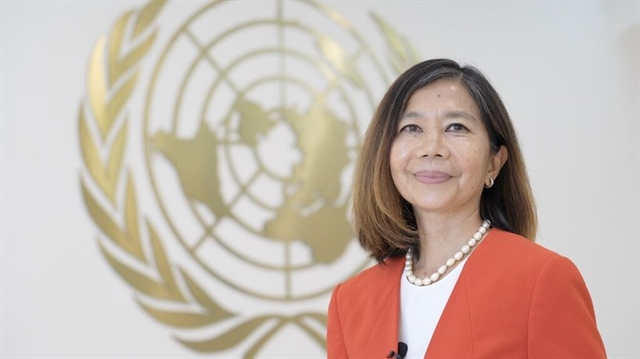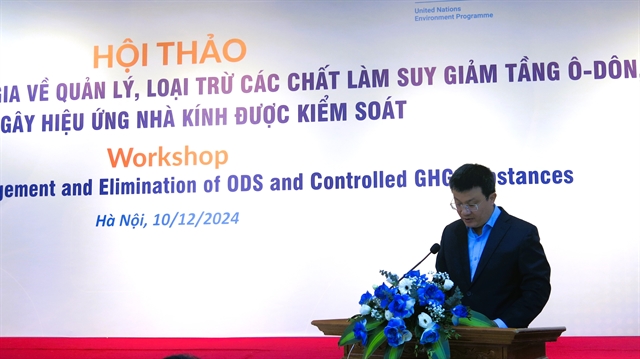 Politics & Law
Politics & Law

 |
| Nguyễn Tuấn Quang, Deputy Director of the Department of Climate Change delivers his speech at the seminar on Tuesday in Hà Nội.—VNS Photo Nguyễn Hằng |
HÀ NỘI — The Department of Climate Change under the Ministry of Natural Resources and Environment has provided stakeholders guidance on the implementation of legal regulations on the gradual reduction of the consumption of environmentally destructive substances.
The department has also given stakeholders detailed information regarding the national policy and roadmap for the management and phase-out of controlled substances, in line with the National Plan for the Management and Elimination of Ozone-Depleting Substances and Controlled Greenhouse Gases.
This was presented at a seminar, which also offered possible technological solutions for the businesses involved, held in Hà Nội on Tuesday morning.
Deputy Director of the Department of Climate Change Nguyễn Tuấn Quang said that the seminar would help participants better understand the management measures aimed at reducing emissions to protect the ozone layer.
That would also assist businesses in developing their medium and long-term business plans in line with the national roadmap for the management and phase-out of these substances.
The seminar was attended by representatives from relevant units across ministries, industrial park management boards, businesses involved in the maintenance, repair, production of refrigeration and air conditioning equipment, organisations and businesses importing controlled substances, those importing products and equipment containing controlled substances or owning high-capacity refrigeration and air conditioning equipment along with customs agencies.
Quang said in line with the provisions set out in the 2020 Law on Environmental Protection and Decree No. 06/2022/NĐ-CP in January 2022 on the reduction of greenhouse gas emissions and ozone layer protection, the ministry had led the development and submission of the national plan to the Prime Minister.
The plan, approved in June 2024, integrated comprehensive management requirements and aligned with international commitments, climate change response initiatives, ozone layer protection and sustainable cooling efforts that Việt Nam was actively involved in.
There were several specific objectives outlined in the plan for implementation through to 2045. The first was effectively honouring the commitment not to produce, import, temporarily import, re-export, or consume substances and products containing or produced using substances that have been fully phased out, in line with the prescribed timeline.
The second was reducing the use of controlled substances in products and equipment, in accordance with the roadmap outlined in the plan as well as improving the average energy efficiency of products and equipment using controlled substances.
Another objective was that technicians involved in the installation, operation and maintenance of products and equipment containing controlled substances must possess the appropriate qualifications, certificates and relevant certifications. Controlled substances must be collected, stored, transported, reused, or recycled in line with technical requirements, or disposed of if they do not meet these standards.
Moreover, addressing the need to reduce the urban heat island effect and enhance resilience against extreme heat would be integrated into national and provincial urban development programmes, plans and regulations. This includes gradually improving technical standards for designing, constructing and operating buildings that meet energy balance requirements and green building criteria.
2024 marks the 30th anniversary of Việt Nam’s participation in the Vienna Convention and the Montreal Protocol.
According to statistics released by the Ozone Secretariat in July 2024, Việt Nam has successfully eliminated the consumption of 220 million tonnes of carbon equivalent through its phase-out activities since 1994.
Việt Nam is internationally recognised as an active and highly responsible member, having made significant efforts in implementing tasks, solutions and achieving important results in the management and elimination of controlled substances.
The country has also joined the United Nations Environment Programme’s Cooling Efficiency Improvement Alliance, the Japan-led Fluorocarbon Lifecycle Management Initiative, and the Global Cooling Pledge, with a goal to reduce global cooling-related emissions by at least 68 per cent by 2050 compared to 2022 levels, in order to limit global temperature rise to 1.5 degrees Celsius.
Currently, most substances that deplete the ozone layer and contribute to the greenhouse effect are used in the fields of refrigeration and air conditioning. Ozone depleting substances include chlorofluorocarbons (CFCs), hydrochlorofluorocarbons (HCFCs), halons, methyl bromide, carbon tetrachloride, hydrobromofluorocarbons, chlorobromomethane and methyl chloroform.— VNS




